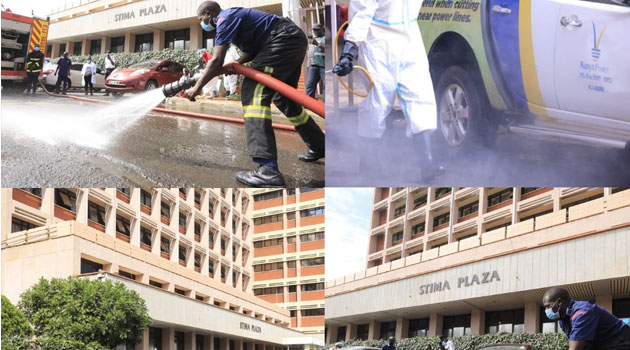Personnel under the Green Nairobi initiative deployed fumigation machines, water boozers, and cleaning equipment, following a restoration order by National Environment Management Authority (NEMA).
City Hall has dispatched its staff to Parklands’ Stima Plaza and parts of Ngara to undertake a comprehensive fumigation, sanitation, and cleanup exercise, days after apologizing for a dramatic garbage dump.
Personnel under the Green Nairobi initiative deployed fumigation machines, water boozers, and cleaning equipment, on Saturday following a restoration order by National Environment Management Authority (NEMA).
Public Health Chief Officer Tom Nyakaba, who oversaw the exercise, confirmed City Hall’s commitment to hygene, confirming that crucial services like water and sewer lines had been fully connected.

“It is our duty to ensure that people live and work in a clean environment. Today, we are here at Stima Plaza to assure occupants that their surroundings are safe and hygienic,” Nyakaba stated.
The cleanup, scheduled for the weekend when foot traffic is lower, saw Green Army teams fumigate both the interior and exterior of the building, while water boozers with treated water washed down roads in Ngara.
“This is part of an ongoing citywide exercise to clean up Nairobi, now extending into estates in a coordinated manner. Our teams are also deployed in various parts of the city today,” Nyakaba added.
Resolved differences
City Hall termed the move as commitment to the resolution of a long-standing dispute between Nairobi City County Government (NCCG) and Kenya Power and Lighting Company (KPLC) over unpaid wayleave fees amounting to Sh4.8 billion and electricity bills owed by the county.
Governor Johnson Sakaja, who addressed the issue following a high-level intervention by the Head of Public Service Felix Koskei, confirmed that he and Energy Cabinet Secretary Opiyo Wandayi had agreed to work on resolving the matter.
“We have agreed to take up the issue with the CS and find a lasting solution,” he told reporters in a solo press conference following the meeting convened by Koskei.
“An unfortunate incident occurred where one of our trucks tipped garbage in the area. That was not the intention, and within 30 minutes, we had cleared it. We are investigating the matter internally,” Sakaja assured. Capital News






